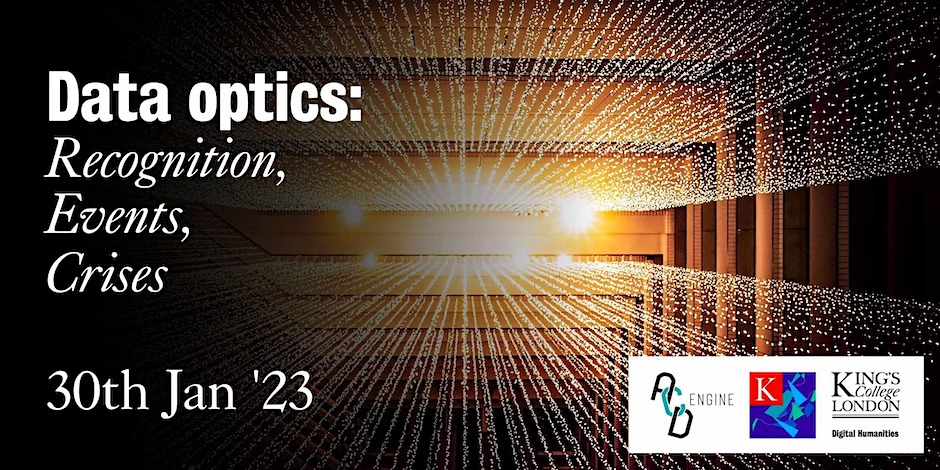Join us for a workshop on Data Optics: Recognition, Events, Crises co-organised by the Australian Cultural Data Engine, King’s Digital Lab and the Department of Digital Humanities at King’s College London.
You can register and find further details here. The event summary and schedule are also copied below.
Gaps in data and the decolonising of the historical record, queer data, data and memory, data performativity, and data ecologies are all under scrutiny. Can data deliver an alternative optics? Can data optics enable ways of seeing that are generative for new praxes and forms of recognition? This half-day symposium aims to think more about what narratives and events are recorded or created by the accumulation and manipulation of data, and to consider if and how data might facilitate responses to crises, when all else fails.
Topics to be covered include:
- Queer data and data biases
- Data identities, representation and visibility
- Retro data and reproduction
- Social registers and the everyday
- Data sovereignty
- Data mobility – centrality and distributions
This panel discussion will be organised around eight 10 minute talks by leading cultural data researchers, followed by ‘network provocations’ from two interlocutors designed to prompt a panel discussion.
Interested participants will be invited to participate in a funding workshop later in the week, focussed on enabling future United Kingdom – Australian collaboration.
Schedule:
1.00pm: Welcome
1.05pm – 1.30pm: Overview & Transnational Cultural Data Landscapes (James Smithies and Rachel Fensham)
1.30pm – 2.50pm
PANEL 1: “What are we doing with national collections in this period of decolonising data?”
- Gabriele Salciute Civiliene (King’s College London): ‘Cultural Heritage Data Through the Lens of Geopolitical Crisis: A Case Study of Wooden Churches in Ukraine’
- Jessica Witte (University of Edinburgh): ‘Crowdsourcing Digital Curation: An Exploration of the Internet Archive’s Text Collections’
- Patricia Murrieta Flores (Lancaster University): ’Can we ever reach decolonial Artificial Intelligence’
- Chris Hay (Flinders University): ‘Six Degrees of Simon Stone: Decentring the Auteur’
2.50pm – 3.00pm: Break
3.00pm – 4.30pm
PANEL 2: “In what ways are advanced technologies shifting how we consider historical and contemporary data representations?”
- Laura Gibson (King’s College London): TBC
- Scott Wark (University of Kent): ‘How to find what’s not there: Data’s present absences’
- Zeena Feldman (King’s College London): ‘New and Old: On Technologies of Migrant Storytelling’
- Tyne Daile Sumner (University of Melbourne): ‘Australian Cultural Data: Biography, Politics, Gender’
4.30pm – 5.00pm: Responses & discussion
About ACD-Engine
The Australian Cultural Data Engine is a multidisciplinary project based at the University of Melbourne that harnesses leading cultural databases to analyse cultural production, artistic networks, and the socio-economic implications of arts and cultural data. We aim to improve the quality of cultural data available to researchers, industry and government and to facilitate interoperability across platforms, systems and regions.
About King’s Digital Lab
King’s Digital Lab (KDL) is based in the Faculty of Arts at King’s College London. We are more than software developers: we are Research Software Engineers (RSEs) with decades of collective experience working with researchers from a variety of disciplines to achieve their goals. We develop research solutions iteratively, using a range of tools and processes that can handle the most common challenges of digital research in the humanities and social sciences. We build resources designed to answer questions, store content, publish results, and push the boundaries of computationally- intensive research.
King’s Department of Digital Humanities
Digital Humanities, in one form or another, has been researched, studied and taught at King’s College London since the 1970s. With over 700 postgraduate and undergraduate students currently enrolled in courses in the Department, many seek the skills to acquire, analyse, interpret and present computational data. Our large range of undergraduate and postgraduate modules encourage students to engage in critical inquiry with and about the digital.

